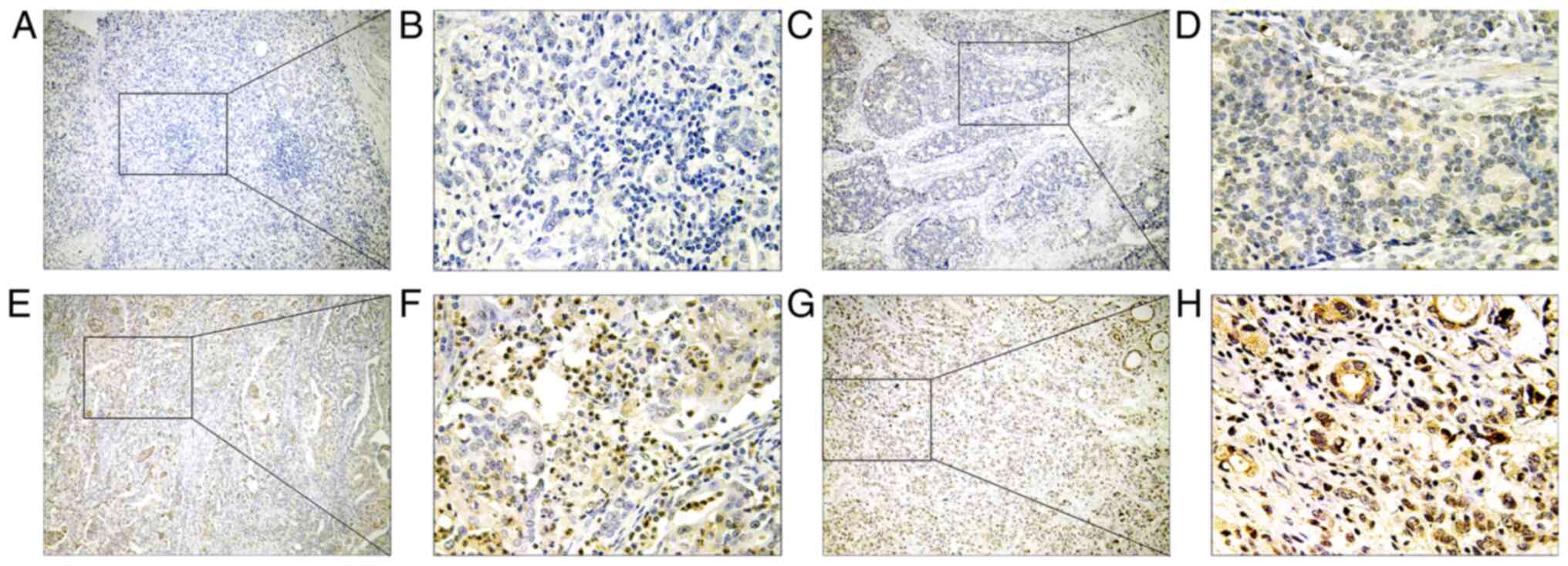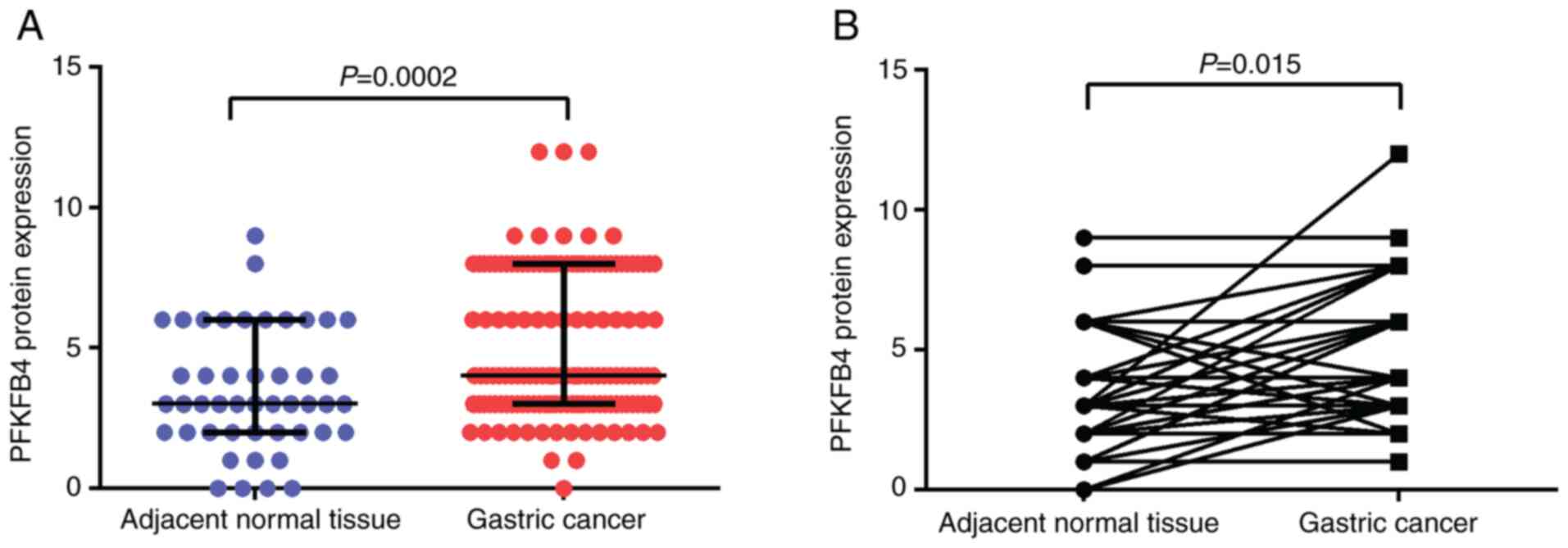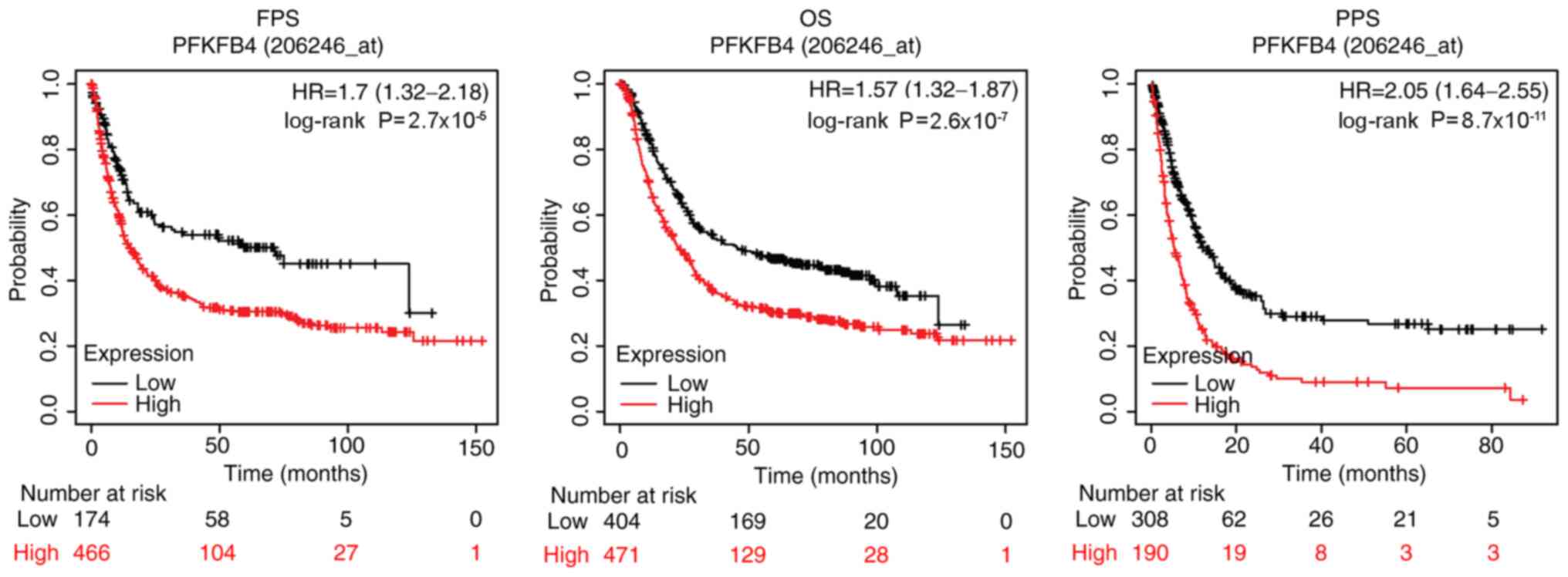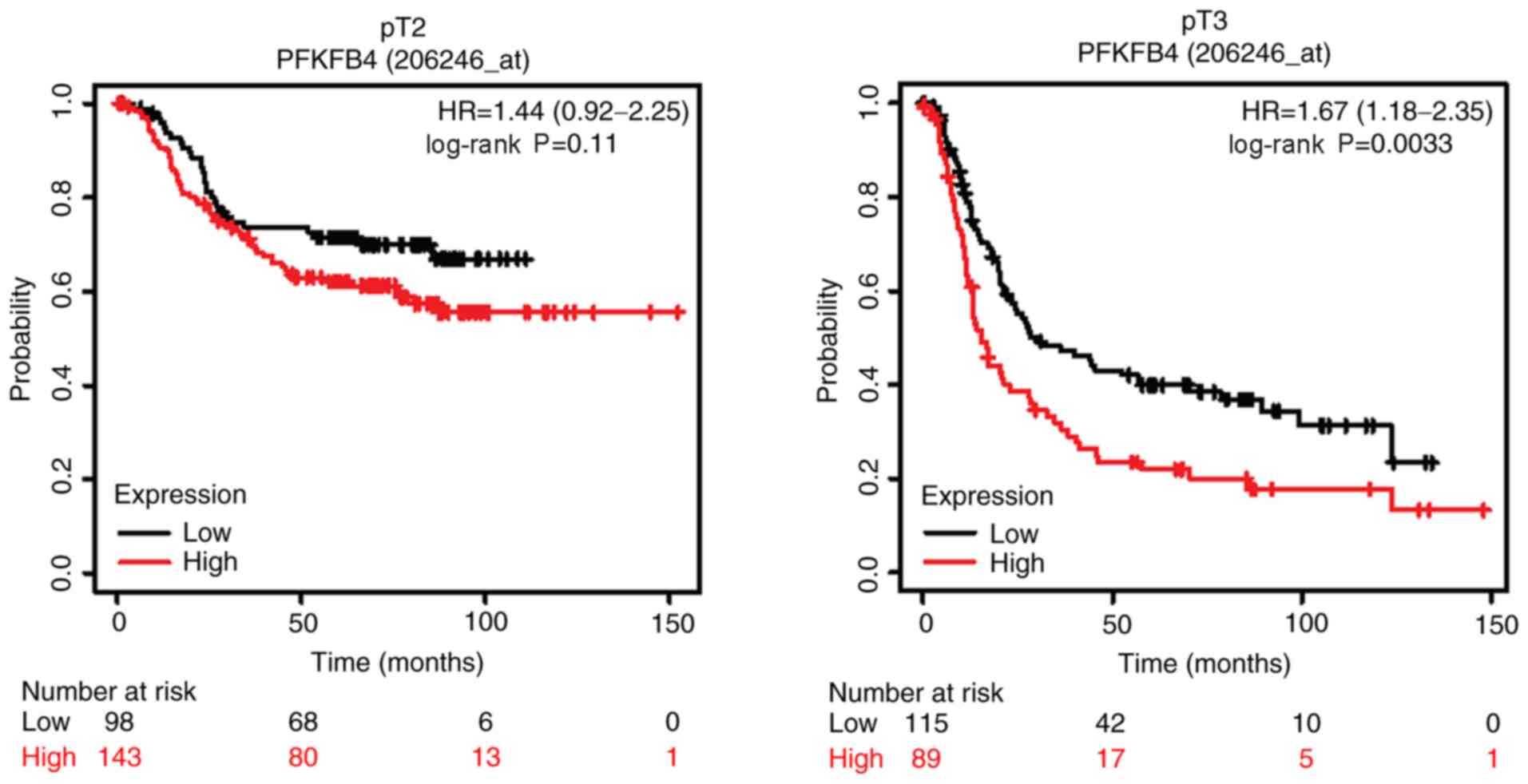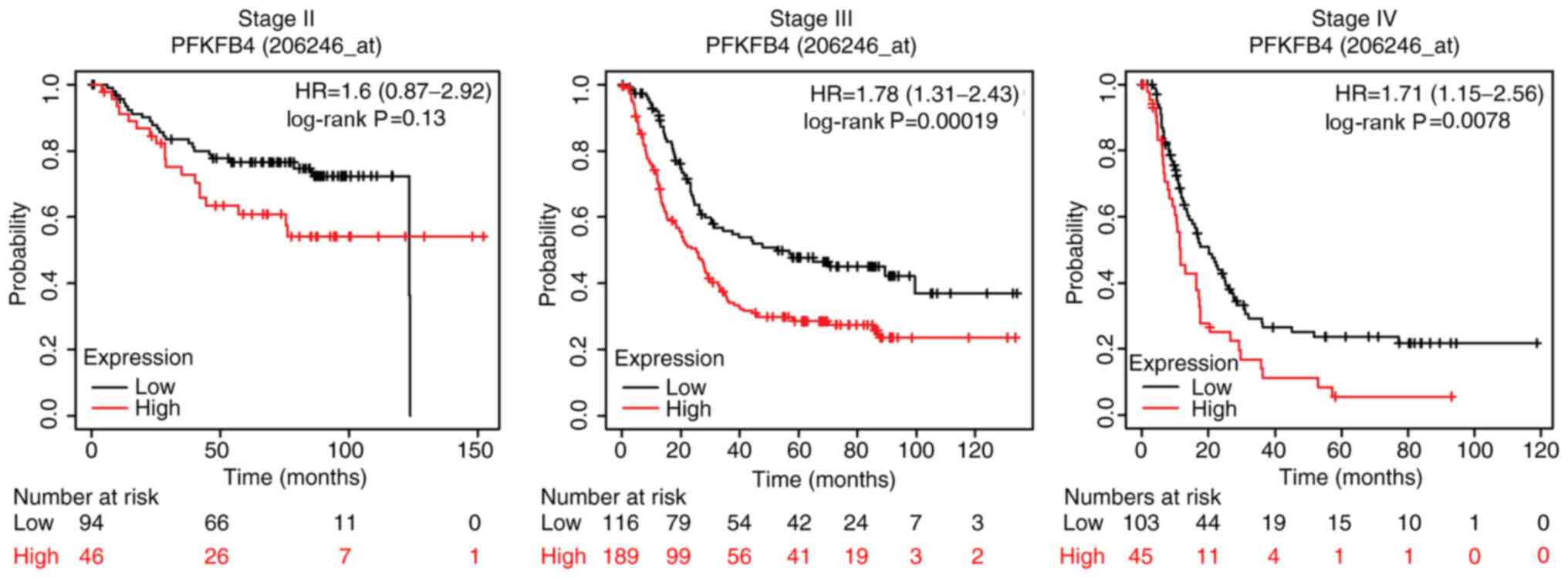|
1
|
Bray F, Ferlay J, Soerjomataram I, Siegel
RL, Torre LA and Jemal A: Global cancer statistics 2018: GLOBOCAN
estimates of incidence and mortality worldwide for 36 cancers in
185 countries. CA Cancer J Clin. 68:394–424. 2018. View Article : Google Scholar : PubMed/NCBI
|
|
2
|
Cheng C, Zhang Q, Zhuang L and Sun J:
Prognostic value of lymphocyte-to-C-reactive protein ratio in
patients with gastric cancer after surgery: A multicentre study.
Jpn J Clin Oncol. 50:1141–1149. 2020. View Article : Google Scholar : PubMed/NCBI
|
|
3
|
Maeda K, Shibutani M, Otani H, Nagahara H,
Ikeya T, Iseki Y, Tanaka H, Muguruma K and Hirakawa K:
Inflammation-based factors and prognosis in patients with
colorectal cancer. World J Gastrointest Oncol. 7:111–117. 2015.
View Article : Google Scholar : PubMed/NCBI
|
|
4
|
Liu H, Zhao YR, Chen B, Ge Z and Huang JS:
High expression of SMARCE1 predicts poor prognosis and promotes
cell growth and metastasis in gastric cancer. Cancer Manag Res.
11:3493–3509. 2019. View Article : Google Scholar : PubMed/NCBI
|
|
5
|
Zhang XG, Song BT, Liu FJ, Sun D, Wang KX
and Qu H: CCR6 overexpression predicted advanced biological
behaviors and poor prognosis in patients with gastric cancer. Clin
Transl Oncol. 18:700–707. 2016. View Article : Google Scholar : PubMed/NCBI
|
|
6
|
Koppenol WH, Bounds PL and Dang CV: Otto
Warburg's contributions to current concepts of cancer metabolism.
Nat Rev Cancer. 11:325–327. 2011. View
Article : Google Scholar : PubMed/NCBI
|
|
7
|
Lai W, Wang Z and Liang HJ: Expression of
6-phosphofructokinase-2 in colorectal cancer and its clinical
significance. J Third Military Med University (Chinese).
39:983–989. 2017.
|
|
8
|
Chesney J, Clark J, Klarer AC,
Imbert-Fernandez Y, Lane AN and Telang S: Fructose-2,6-bisphosphate
synthesis by 6-phosphofructo-2-kinase/fructose-2,6-bisphosphatase 4
(PFKFB4) is required for the glycolytic response to hypoxia and
tumor growth. Oncotarget. 5:6670–6686. 2014. View Article : Google Scholar : PubMed/NCBI
|
|
9
|
Li XM and Li W: Progress in the study on
the role of PFKFB4 and potential mechanism in tumor glucose
metabolism. Chin J N Clin Med. 11:1044–1048. 2018.
|
|
10
|
Li W, Qian L, Lin J, Huang G, Hao N, Wei
X, Wang W and Liang J: CD44 regulates prostate cancer
proliferation, invasion and migration via PDK1 and PFKFB4.
Oncotarget. 8:65143–65151. 2017. View Article : Google Scholar : PubMed/NCBI
|
|
11
|
Wang M and Sun TY: Effects of PFKFB4 on
invasion and migration of gastric cancer cells and its mechanism. J
Pract Oncol (Chinese). 34:229–234. 2020.
|
|
12
|
Washington K: 7th Edition of the AJCC
cancer staging manual: Stomach. Ann Surg Oncol. 17:3077–3079. 2010.
View Article : Google Scholar : PubMed/NCBI
|
|
13
|
Xu L and Yang WT: The judgement standard
of immunohistochemical reaction results. Chin Oncol. 6:229–231.
1996.
|
|
14
|
Gao R, Liu Y, Li D, Xun J, Zhou W, Wang P,
Liu C, Li X, Shen W, Su W, et al: PFKFB4 promotes breast cancer
metastasis via induction of hyaluronan production in a
p38-Dependent manner. Cell Physiol Biochem. 50:2108–2123. 2018.
View Article : Google Scholar : PubMed/NCBI
|
|
15
|
Li X, Chen Z, Li Z, Huang G, Lin J, Wei Q,
Liang J and Li W: The metabolic role of PFKFB4 in
androgen-independent growth in vitro and PFKFB4 expression in human
prostate cancer tissue. BMC Urol. 20:612020. View Article : Google Scholar : PubMed/NCBI
|
|
16
|
Zhang H, Lu C, Fang M, Yan W, Chen M, Ji
Y, He S, Liu T, Chen T and Xiao J: HIF-1α activates hypoxia-induced
PFKFB4 expression in human bladder cancer cells. Biochem Biophys
Res Commun. 476:146–152. 2016. View Article : Google Scholar : PubMed/NCBI
|
|
17
|
Lu H, Chen S, You Z, Xie C, Huang S and Hu
X: PFKFB4 negatively regulated the expression of histone
acetyltransferase GCN5 to mediate the tumorigenesis of thyroid
cancer. Dev Growth Differ. 62:129–138. 2020. View Article : Google Scholar : PubMed/NCBI
|
|
18
|
Chesney J, Clark J, Lanceta L, Trent JO
and Telang S: Targeting the sugar metabolism of tumors with a
first-in-class 6-phosphofructo-2-kinase (PFKFB4) inhibitor.
Oncotarget. 6:18001–18011. 2015. View Article : Google Scholar : PubMed/NCBI
|
|
19
|
Minchenko OH, Tsuchihara K, Minchenko DO,
Bikfalvi A and Esumi H: Mechanisms of regulation of PFKFB
expression in pancreatic and gastric cancer cells. World J
Gastroenterol. 20:13705–13717. 2014. View Article : Google Scholar : PubMed/NCBI
|
|
20
|
Ros S, Floter J, Kaymak I, Da Costa C,
Houddane A, Dubuis S, Griffiths B, Mitter R, Walz S, Blake S, et
al: 6-Phosphofructo-2-kinase/fructose-2,6-biphosphatase 4 is
essential for p53-null cancer cells. Oncogene. 36:3287–3299. 2017.
View Article : Google Scholar : PubMed/NCBI
|
|
21
|
Shu Y, Lu Y, Pang X, Zheng W, Huang Y, Li
J, Ji J, Zhang C and Shen P: Phosphorylation of PPARg at Ser84
promotes glycolysis and cell proliferation in hepatocellular
carcinoma by targeting PFKFB4. Oncotarget. 7:76984–76994. 2016.
View Article : Google Scholar : PubMed/NCBI
|
|
22
|
Gao R, Li D, Xun J, Zhou W, Li J, Wang J,
Liu C, Li X, Shen W, Qiao H, et al: CD44ICD promotes breast cancer
stemness via PFKFB4-mediated glucose metabolism. Theranostics.
8:6248–6262. 2018. View Article : Google Scholar : PubMed/NCBI
|
|
23
|
Trojan SE, Piwowar M, Ostrowska B, Laidler
P and Kocemba-Pilarczyk KA: Analysis of malignant melanoma cell
lines exposed to hypoxia reveals the importance of PFKFB4
overexpression for disease progression. Anticancer Res.
38:6745–6752. 2018. View Article : Google Scholar : PubMed/NCBI
|
|
24
|
Wang Q, Zeng F, Sun Y, Qiu Q, Zhang J,
Huang W, Huang J, Huang X and Guo L: Etk interaction with PFKFB4
modulates chemoresistance of small-cell lung cancer by regulating
autophagy. Clin Cancer Res. 24:950–962. 2018. View Article : Google Scholar : PubMed/NCBI
|
|
25
|
Dasgupta S, Rajapakshe K, Zhu B, Nikolai
BC, Yi P, Putluri N, Choi JM, Jung SY, Coarfa C, Westbrook TF, et
al: Metabolic enzyme PFKFB4 activates transcriptional coactivator
SRC-3 to drive breast cancer. Nature. 556:249–254. 2018. View Article : Google Scholar : PubMed/NCBI
|
|
26
|
Yao L, Wang L, Cao ZG, Hu X and Shao ZM:
High expression of metabolic enzyme PFKFB4 is associated with poor
prognosis of operable breast cancer. Cancer Cell Int. 19:1652019.
View Article : Google Scholar : PubMed/NCBI
|
|
27
|
Yun SJ, Jo SW, Ha YS, Lee OJ, Kim WT, Kim
YJ, Lee SC and Kim WJ: PFKFB4 as a prognostic marker in
non-muscle-invasive bladder cancer. Urol Oncol. 30:893–899. 2012.
View Article : Google Scholar : PubMed/NCBI
|















